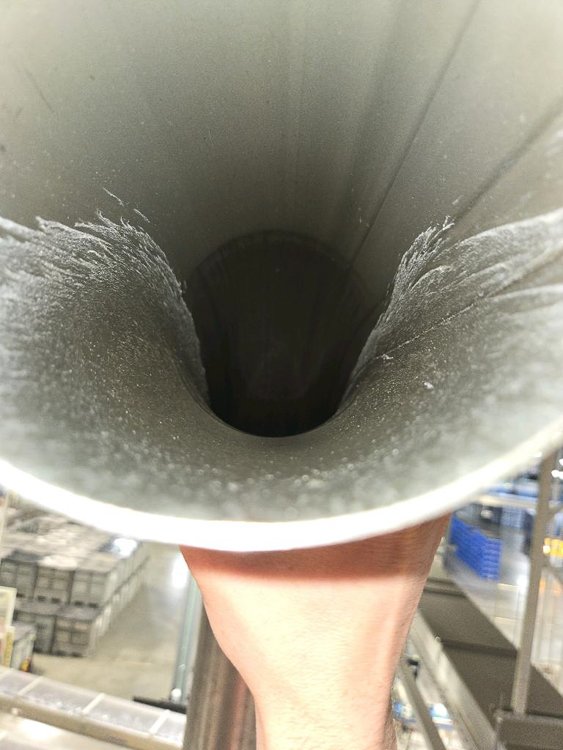Phone: 218-481-3500
Snakeskin or Streamers: The Hidden Challenge of Polymer Buildup in Plastic Pellet Transport
In the fast-paced world of plastic manufacturing, efficiency drives profitability. Plastic pellets—the foundational granules of countless products—are conveyed through extensive piping systems at high velocities via dilute phase pneumatic conveying. Yet, this efficiency comes with a catch: a phenomenon known as “Snakeskin or streamers,” where polymer residue builds up inside pipes. This buildup can contaminate pellets and halt production, costing manufacturers time and money. Fortunately, companies like J.E. Baker Field Service LLC specialize in tackling this issue, offering tailored solutions to keep production lines running smoothly.
What is Snakeskin or Streamers?
Snakeskin/streamers refer to the thin, wispy strands or filmy layers of polymer that accumulate on the inner walls of pipes during the high-velocity transport of plastic pellets. Named for its snake-like appearance or delicate, hair-like strands, this buildup forms when pellets, moving at velocities often exceeding 20-30 meters per second, generate friction and heat through collisions with pipe surfaces. The heat softens or melts the pellet edges, leaving residue that sticks and grows over time and then releases into the product flow. J.E. Baker Field Service LLC understands this process intimately and has developed expertise in diagnosing and mitigating Snakeskin across a range of polymer types, including polyethylene (PE), polypropylene (PP), and polyvinyl chloride (PVC).
The severity of Snakeskin or streamers depends on factors like the polymer’s composition, process temperature, pipe design, airflows, and transport conditions. J.E. Baker Field Service LLC excels at identifying these variables, ensuring that their clients receive precise, effective interventions to reduce or remove the buildup.
Snakeskin Example
Don’t let Snakeskin or Streamers slow your production—contact us today for expert solutions that keep your pipes clear and your pellets pure

How Does Snakeskin or Streamers Form?
The root cause lies in the physics of pneumatic conveying. As pellets race through pipes under high-pressure air, several processes unfold:
- Process Temperatures: The first step in troubleshooting is to determine the temperature of the plastic pellets being introduced into the pneumatic conveying system.
- Friction and Heat Generation: Collisions between pellets and pipe walls produce frictional heat, softening low-molecular-weight polymer fractions.
- Shearing and Smearing: This softened polymer smears onto smooth pipe surfaces, particularly in long radius bends. Shearing is caused by protrusions within the convey pipes (E.g., misaligned flanges, welded sections of pipe that haven’t been grounded smoothed), or a combination of both.
- Accumulation: Over time, these deposits grow into streamers or tougher, skin-like layers.
J.E. Baker Field Service LLC has observed this cycle in many facilities. Their field service teams are adept at analyzing transport systems to pinpoint where Snakeskin forms most aggressively. They offer customized fixes that address the root causes rather than just the symptoms.
The Consequences: Contamination and Disruption
Snakeskins and Streamers aren’t merely cosmetics; they deliver real headaches for manufacturers:
- Contamination of Pellets: Fragments of Snakeskins can break off and mix with virgin pellets, introducing impurities that cause defects in finished products—think streaks or weak spots in critical applications like medical devices or food packaging.
- Production Downtime: Snake skins and Streamers (Angle hair) can cause downtime in upstream and downstream equipment, such as dust collectors, feeders, rotary valves, diverter valves, and the conveying systems themselves.
J.E. Baker Field Service LLC steps in to prevent these disruptions. With their preventative strategies, they help manufacturers avoid contamination and minimize downtime, protecting both product quality and equipment longevity.
Managing the Snakeskin and Streamer Problem with J.E. Baker Field Service LLC
While Snakeskin poses a persistent challenge, J.E. Baker Field Service LLC offers proven solutions to manage and eliminate it. Their approach combines cutting-edge techniques with practical, on-site expertise:
- Optimized Transport Systems: J.E. Baker Field Service LLC consults on adjusting conveying airflows to reduce friction and heat, tailoring velocity profiles—such as slower speeds at bends—to curb buildup without sacrificing throughput.
- Pipe Design Expertise: They recommend and will install shot peen or other technologies to minimize surfaces where the polymer can adhere. Their team will also advise on whether or not to eliminate long-radius 90’s.
- Cleaning Devices: There are many pellet cleaning devices manufactured by various manufacturers. J.E. Baker Field Service LLC will recommend and install the one that makes sense for your process, before shipping or receiving your plastic pellets.
Beyond these hands-on fixes, J.E. Baker Field Service LLC stays ahead of the curve by exploring innovations like real-time buildup sensors and automated cleaning systems. While these technologies are still emerging, their commitment to practical, cost-effective solutions makes them a go-to partner for manufacturers battling Snakeskin, Streamer, or fines.
A Broader Perspective
Snakeskin reflects the broader balancing act in plastic production: efficiency versus quality, and the hidden costs of industrial processes. For J.E. Baker Field Service LLC, solving this issue isn’t just about clearing pipes—it’s about ensuring the reliability of the materials that fuel modern life. Their work also touches on environmental concerns, as polymer residues from transport systems, if mishandled, can contribute to microplastic pollution. By keeping systems clean and efficient, they help mitigate these risks.
As plastic demand rises, so does the need for experts like J.E. Baker Field Service LLC. Their ability to tackle the degradation of your product head-on ensures that manufacturers can maintain production without compromising quality or sustainability. In an industry where every inefficiency matters, J.E. Baker Field Service LLC demonstrates that even the most challenging problems can be addressed through the reliability of the materials that shape our modern world.


